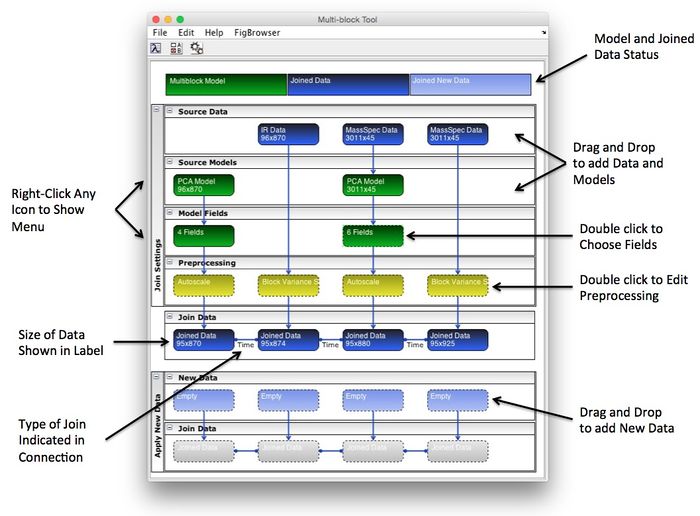Multiblocktool
Multiblock Tool
Introduction
Joining data blocks from multiple data sources can be challenging depending on where the data has come from and the attributes included with the data. Dome data sets are collected at higher frequency than others, some have missing data, and some need to be modeled before joining. The Mulitblock Tool is an interface designed to make joining data easier and more transparent.
Multiblock Tool Interface
Getting Started
Data blocks can be joined in a variety of ways. The simplest way is for blocks to be equally sized. In some cases blocks are not equally sized but they do have samples in common and can be matched by sample label name. Finally, blocks may be sampled at different rates over the same period of time. If a time axisscale is included with both datasets samples can be automatically co-added to match the size.
Adding Data
To add data to Multiblock Tool drag and drop it from the Workspace Browser, Matlab Workspace, or from a file. If the data has variable class information you will be prompted and asked if you'd like to split the block into separate datasets for each class. The data will then be loaded. Default preprocessing will be added, group scaling for data and autoscale for models.
Setting Up the Join
Once data is loaded, use right-click menus to edit and model raw data. Next, adjust preprocessing as appropriate. If a model is being used, choose fields to be used form the model. When choosing the first time, default fields will be selected. Finally, click the gears button to join the data. If any problems occur an error message will appear indicating the problem.
Repeating a Join
Repeating a join can be done in the same window by adding data to the New Data area. Note that where models are used they will be applied to new data and fields extracted as above.
Analyzing Joined Data
Use the right-click menus on the joined data icons at the top of the window to send the data to the Analysis window. Data will have a variable class indicating the original data.


